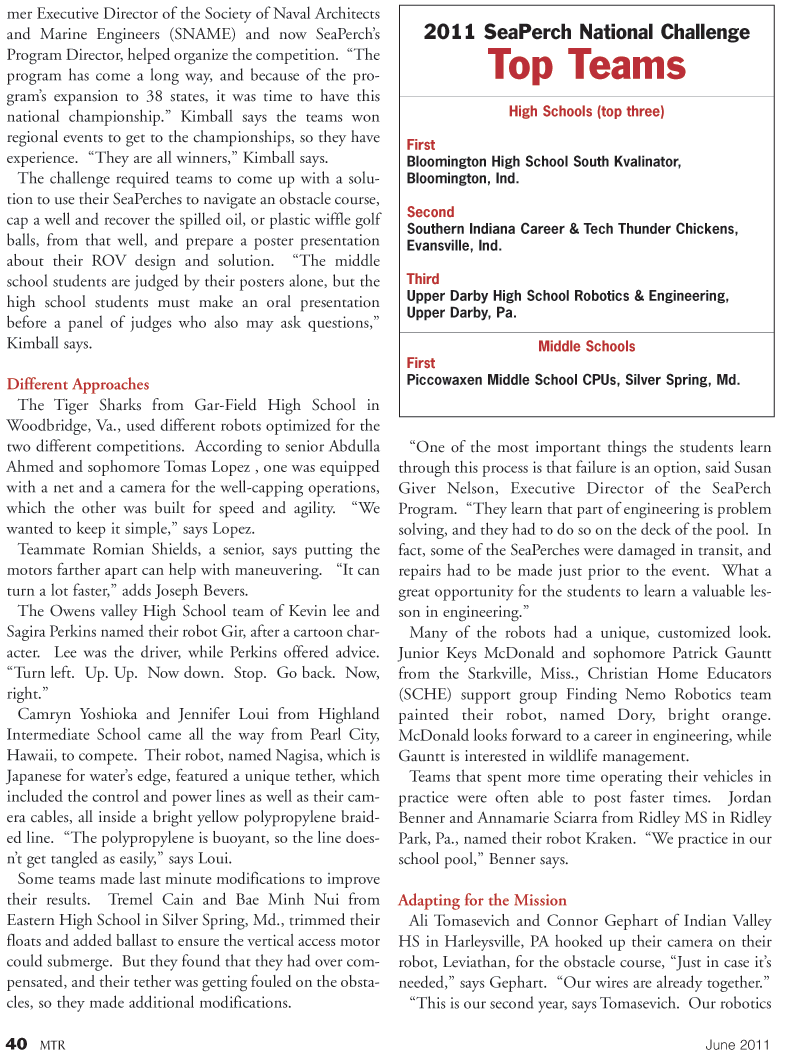
Page 40: of Marine Technology Magazine (June 2011)
Hydrographic Survey
Read this page in Pdf, Flash or Html5 edition of June 2011 Marine Technology Magazine
40 MTR June 2011 mer Executive Director of the Society of Naval Architects and Marine Engineers (SNAME) and now SeaPerch’s
Program Director, helped organize the competition. “The program has come a long way, and because of the pro- gram’s expansion to 38 states, it was time to have this national championship.” Kimball says the teams won regional events to get to the championships, so they have experience. “They are all winners,” Kimball says.
The challenge required teams to come up with a solu- tion to use their SeaPerches to navigate an obstacle course, cap a well and recover the spilled oil, or plastic wiffle golf balls, from that well, and prepare a poster presentation about their ROV design and solution. “The middle school students are judged by their posters alone, but the high school students must make an oral presentation before a panel of judges who also may ask questions,”
Kimball says.
Different Approaches
The Tiger Sharks from Gar-Field High School in
Woodbridge, Va., used different robots optimized for the two different competitions. According to senior Abdulla
Ahmed and sophomore Tomas Lopez , one was equipped with a net and a camera for the well-capping operations, which the other was built for speed and agility. “We wanted to keep it simple,” says Lopez.
Teammate Romian Shields, a senior, says putting the motors farther apart can help with maneuvering. “It can turn a lot faster,” adds Joseph Bevers.
The Owens valley High School team of Kevin lee and
Sagira Perkins named their robot Gir, after a cartoon char- acter. Lee was the driver, while Perkins offered advice. “Turn left. Up. Up. Now down. Stop. Go back. Now, right.”
Camryn Yoshioka and Jennifer Loui from Highland
Intermediate School came all the way from Pearl City,
Hawaii, to compete. Their robot, named Nagisa, which is
Japanese for water’s edge, featured a unique tether, which included the control and power lines as well as their cam- era cables, all inside a bright yellow polypropylene braid- ed line. “The polypropylene is buoyant, so the line does- n’t get tangled as easily,” says Loui.
Some teams made last minute modifications to improve their results. Tremel Cain and Bae Minh Nui from
Eastern High School in Silver Spring, Md., trimmed their floats and added ballast to ensure the vertical access motor could submerge. But they found that they had over com- pensated, and their tether was getting fouled on the obsta- cles, so they made additional modifications. “One of the most important things the students learn through this process is that failure is an option, said Susan
Giver Nelson, Executive Director of the SeaPerch
Program. “They learn that part of engineering is problem solving, and they had to do so on the deck of the pool. In fact, some of the SeaPerches were damaged in transit, and repairs had to be made just prior to the event. What a great opportunity for the students to learn a valuable les- son in engineering.”
Many of the robots had a unique, customized look.
Junior Keys McDonald and sophomore Patrick Gauntt from the Starkville, Miss., Christian Home Educators (SCHE) support group Finding Nemo Robotics team painted their robot, named Dory, bright orange.
McDonald looks forward to a career in engineering, while
Gauntt is interested in wildlife management.
Teams that spent more time operating their vehicles in practice were often able to post faster times. Jordan
Benner and Annamarie Sciarra from Ridley MS in Ridley
Park, Pa., named their robot Kraken. “We practice in our school pool,” Benner says.
Adapting for the Mission
Ali Tomasevich and Connor Gephart of Indian Valley
HS in Harleysville, PA hooked up their camera on their robot, Leviathan, for the obstacle course, “Just in case it’s needed,” says Gephart. “Our wires are already together.” “This is our second year, says Tomasevich. Our robotics 2011 SeaPerch National Challenge
Top Teams
High Schools (top three)
First
Bloomington High School South Kvalinator,
Bloomington, Ind.
Second
Southern Indiana Career & Tech Thunder Chickens,
Evansville, Ind.
Third
Upper Darby High School Robotics & Engineering,
Upper Darby, Pa.
Middle Schools
First
Piccowaxen Middle School CPUs, Silver Spring, Md.

 39
39

 41
41
